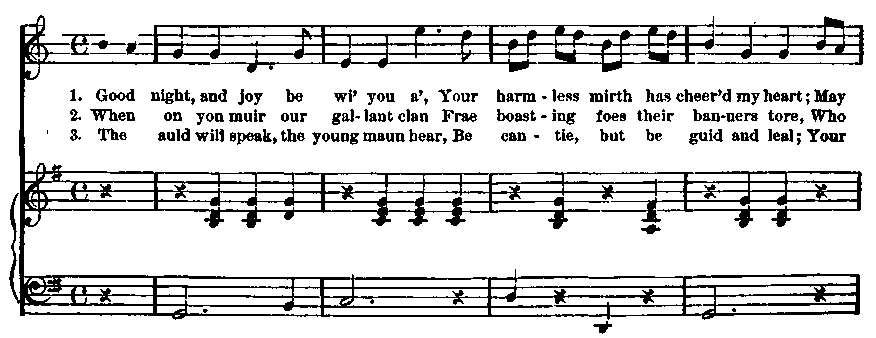Familiar Songs - Their Authors & Histories
300 traditional songs, inc sheet music with full piano accompaniment & lyrics.
| Share page | Visit Us On FB |
|
650 OUR FAMILIAR SONGS. |
||
|
at Oxford. When he was twenty years old his father died, leaving him a large estate. With literary taste and leisure he spent several years in travel, and then took up his permanent abode in his Scottish home of Auchinleck. He wrote both prose and verse, and some of his poems were reprinted in London. Sir Alexander suggested the erection of a monument to Burns on the banks of the Doon, and advertised that a meeting would be held to discuss the matter. The day arrived, and the hour,—yes, and the man, just one. Sir Alexander took the chair, and his friend became clerk. Suitable resolutions were proposed, seconded, and recorded, and the meeting broke up in perfect harmony. The resolutions were immediately printed and widely circulated, and the result was a public subscription of two thousand pounds, and Sir Alexander laid the corner-stone of the monument. He died from the effects of a shot received in a political duel, on the 27th of March, 1822.
" Johnny Armstrong's Good Night," the famous old air to which the parting songs are set, was called "Fare-thou-well, Gilk-nock-hall." In " The Complaint of Scotland," the tune is mentioned as one of the dances to which the "lycht lopene" shepherds tripped the green, said in the "Complaint" to be "ane celest recreation to behold, and called "Thonne Ermistrange's dance." Gilknock-hall, in Liddesdale, was the ancient seat of the Armstrongs. The Armstrong to whom the words of the later songs refer, was named Thomas, and was said to have been executed in 1601, for the murder of Sir John Carmichael, of Edrom, Warden of the Middle Marches. The words which he was said himself to have made and sung were these:
" This night is ray departing time, The morn's the day I mun awa'; There's no a friend or fae of mine, But wishes that I were awa.
" What I hae done for lack o' wit I never, never can reca'; I trust ye're a'my friends as yet— Gude night, and joy be wi' ye a' 1" |
||
|
Goldsmith was so touched by this song in his youth, that nothing he heard sung >n after years could charm him like it. In a letter to Hodson he says: " I go to the opera, where Signor Columba pours out all the mazes of melody. I sit and and sigh for Lishoy's fireside, and 'Johnny Armstrong's last good-night' from Peggy Golden."
Benjamin Franklin, while travelling beyond the Alleghany Mountains, stayed for a while with a Scottish family living in a lonely place. One evening as they sat in the front door, the lady of the house sang " Sae happy as we a' hae been," in a way so touching that tears came to the eyes of the philosopher, and thirty years afterward he used to speak of the strong impression it made upon him.
Arranged by Edward S. Cummings. Moderato.
*—n- |
||
 |
||